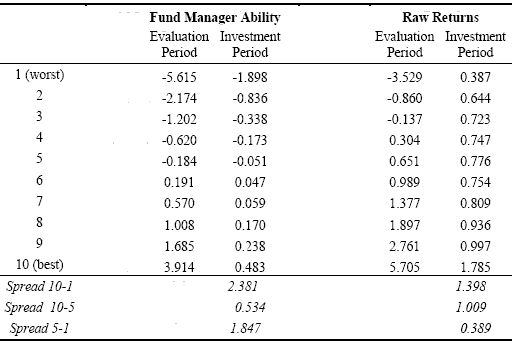Picking the right benchmark is critical when assessing the performance of a fund manager. Benchmark selection is especially difficult for hedge fund managers because of: (1) the number of style options available to them, and (2) the difficulty of assigning specific funds to styles. Should evaluators simply accept the style claims of fund managers for benchmarking purposes? In their recent paper entitled “Hedge Funds: Ability Persistence and Style Bias”, Matteo Belleri and Marco Navone do not. Instead, they calculate a benchmark for each hedge fund by fitting its actual performance over the past three years to a weighted portfolio of ten hedge fund indexes (Convertible Arbitrage, Dedicated Short Bias, Emerging Markets, Market Neutral, Event Driven, Fixed Income Arbitrage, Global Macro, Long/Short Equity, Managed Futures and Multi-Strategy). This approach essentially makes each manager accountable for modifications of fund strategy to benefit from current market conditions. Using the benchmark index data and return data for 3,627 hedge funds over the period 1994-2004, they conclude that:
- After accounting for actual (rather than claimed) investing style, the ability of the best performing hedge fund managers tends not to persist. Evidence of top performer persistence from other studies derives from accepting incorrect fund style claims.
- However, the (lack of) ability of the worst managers does tend to persist.
- These results are important for funds of hedge funds and for institutions employing a two-step portfolio construction process that first sets a multi-style strategy and then selects the best individual hedge funds within each selected style. Recent past performance does not clearly determine the “best” since recent winners do not clearly outperform the median fund within style.
The following table, simplified from one in the paper, summarizes the persistence of hedge fund manager ability and fund raw return from the last quarter (Evaluation Period) to the next quarter (Investment Period). Fund manager ability is the difference between the fund return and the return of a benchmark portfolio of hedge fund indexes weighted to minimize monthly tracking error with the fund over the previous three years. There is evidence of performance persistence in both raw returns and fund manager ability, with significantly positive differences between the average performance of the top and the bottom deciles during the Investment Period. However, persistence of raw returns resides mostly among top performers, and persistence of fund manager ability resides mostly among bottom performers. In other words, persistence of outperformance is more a matter of fund style than manager ability. Persistence of underperformance is more a matter of manager inability than fund style.

In summary, once adjusted for actual (rather than claimed) investing style, recent hedge fund performance is not a reliable indicator of superior manager ability but is a reliable indicator of inferior manager ability.